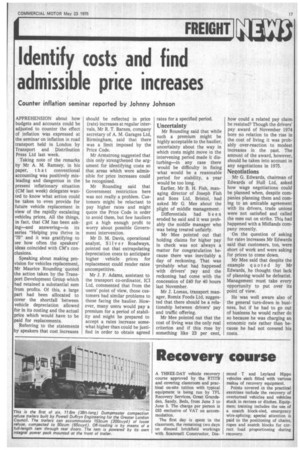Identify costs and find admissible price increases
Page 19

If you've noticed an error in this article please click here to report it so we can fix it.
Counter inflation seminar reported by Johnny Johnson
APPREHENSION about how budgets and accounts could be adjusted to counter the effect of inflation was expressed at the seminar on inflation in road transport held in London by Transport and Distribution Press Ltd last week.
Taking note of the remarks by Mr A. M. Ramsey, in his paper, that conventional accounting was positively misleading and dangerous in the present inflationary situation (CM last week) delegates wanted to know what action could be taken to even provide for future vehicle replacement in view of the rapidly escalating vehicles prices. All the things, in fact, that CM has been asking—and answering—in its series "Helping you thrive in '75" and it was gratifying to see how often the speakers' ideas coincided with CM's conclusions.
Speaking about making provision for vehicles replacement, Mr Maurice Rounding ' quoted the action taken by the Transport Development Group which had retained a substantial sum from profits. Of this, a large part had been allocated to cover the shortfall between vehicle depreciation allowed for in its costing and the actual price which would have to be paid for replacements.
Referring to the statements by speakers that cost increases should be reflected in price (rate) increases at regular intervals, Mr R. T. Barnes, company secretary of A. M. Garages Ltd, Birmingham, said that there was a limit imposed by the Price Code.
Mr Armstrong suggested that this only strengthened the argument for identifying costs so that areas which were admissible for price increases could be recognised.
Mr Rounding said that Government restriction here was not really a problem. Customers might be reluctant to pay higher rates and might quote the Price Code in order to avoid them, but few hauliers got a high enough profit to worry about possible Government intervention.
Mr D. M. Davis, operational analyst, Silver Roadways, pointed out that extrapolating depreciation costs to anticipate higher vehicle prices for replacement could render rates uncompetitive.
Mr J. F. Adams, assistant to the transport co-ordinator, ICI Ltd, commented that from the users' point of view, those customers had similar problems to those facing the haulier. However, many users would pay a premium for a period of stability and might be prepared to accept a rates increase somewhat higher than could be justified in order to obtain agreed rates for a specified period.
Uncertainty
Mr Rounding said that while such a premium might be highly acceptable to the haulier, uncertainty about the way in which costs might move in the intervening period made it disturbing—in any case there would be difficulty in fixing what would be a reasonable period for stability, a year would be too long.
Earlier, Mr B. H. Fish, managing director of Joseph Fish and Sons Ltd, Bristol, had asked Mr G. Mee about the plight of middle management.
Differentials had been eroded he said and it was probably the middle manager who was being treated unfairly.
Mr Mee pointed out that holding claims for higher pay in check was not always a matter for congratulation because there was inevitably a day of reckoning. That was .probably what had happened with drivers' pay and the reckoning had come with the concession of £40 for 40 hours last November.
Mr J. Lomas, transport manager, Romix Foods Ltd, suggested that there should be a relationship between drivers' pay and traffic offering.
Mr Mee pointed out that the cost of living was the only real criterion and if this rose by something like 23 per cent, how could a related pay claim be resisted? Though the drivers' pay award of November 1974 bore no relation to the rise in the cost of living it was probably over-reaction to modest increases in the past. The amount of the award, however, should be taken into account in any negotiations in 1975.
Negotiations
Mr G. Edwards, chairman of Edwards of Hull Ltd, asked how wage negotiations could be planned when, despite companies planning them and coming to an amicable agreement with its drivers, trade unions were not satisfied and called the men out on strike. This had happened with a Midlands company recently.
On the question of asking for rates increases Mr Edwards said that customers, too, were short of work and were asking for prices to come down.
Mr Mee said that despite the example quoted by Mr Edwards, he thought that lack of planning would be defeatist. Management must take every opportunity to put over its point of view.
He was well aware also of the general turn-down in business, but if he had to go out of business he would rather do so because he was charging an economic rate rather than because he had not covered his costs.






























































































